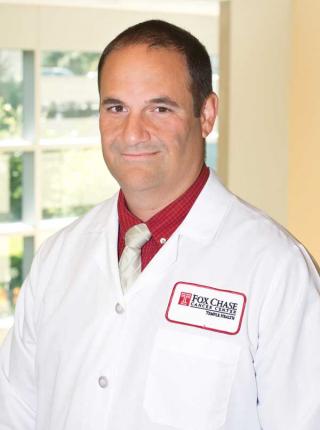
PHILADELPHIA (November 25, 2019) – A Fox Chase Cancer Center researcher has been awarded a $658,800 grant by the U.S. Department of Defense to investigate the role of the immune system and the presence of certain bacteria in mediated responses to chemotherapy in cancers of the bladder.
As bladder cancer more commonly affects military veterans than the general population due to increased exposure to hazardous chemicals and toxins, including Agent Orange and diesel fumes, the outcomes of this study could help the Department of Defense to greatly improve the treatment protocols and prognosis for service members.
The research was conducted by Phillip Abbosh, MD, PhD, assistant professor in the Molecular Therapeutics Program and member of the Kidney, Bladder and Prostate Cancer Translational Research Disease Group at Fox Chase. Abbosh anticipates his research will lead to improved responses to chemotherapy, which could lead to fewer bladder cancer patients requiring a cystectomy as part of their routine care.
“This work could help us understand several previously unrecognized mechanisms contributing to chemotherapy response in bladder cancer, namely activity of the immune system during response and bacteria that may promote or hamper response,” Abbosh said.
Current standard of care for patients with Stage 2 and 3 bladder cancer often necessitates the removal of the bladder despite 30 percent to 40 percent of patients undergoing surgery having a complete response, meaning they had no tumors in the bladder at the time of surgery.
There is currently no reliable method to identify patients who will respond, or have responded, to chemotherapy. As a urologic oncologist and researcher, Abbosh seeks to gain a better understanding of the disparities in patients’ responses to chemotherapy in order to significantly change their treatment protocol and potentially avoid complicated surgery.
His work as a researcher and urologic oncologist who performs cystectomies has led him to suspect the immune system is playing an integral role in regulating the efficacy of chemotherapy medications on bladder tumors.
Previous studies have shown the potential to manipulate the immune system to seek out and destroy tumors. Abbosh is optimistic that his research will lead to a better understanding of how a patient’s immune system is involved in improving the efficacy of chemotherapy used to treat bladder cancer.
Additionally, urine samples from bladder cancer patients have shown the presence of bacteria not normally found in the bladder of otherwise healthy individuals, leading Abbosh to wonder which, if any, of these bacteria are able to detoxify or potentiate chemotherapy treatments.
“If there is a correlation between the presence of certain bacterial species and response to chemotherapy, a future clinical trial could test whether adding a response-associated bacterium to the bladder enhances chemotherapy response in bladder cancer. We commonly place bacteria such as BCG into the bladder to treat bladder cancer, so there is already a strong precedent,” Abbosh said.
As the interaction between the immune system and tumors are better understood, this research could lead to the development of more targeted therapies for patients. Furthermore, by investigating the role of foreign bacteria present in the bladders of cancer patients, Abbosh and his team will seek to establish whether any of these bacteria could be used to enhance chemotherapy treatments. Both aspects of this funded project will hopefully lead to new therapeutic approaches and reduce the number of radical cystectomies for patients diagnosed with bladder cancer.